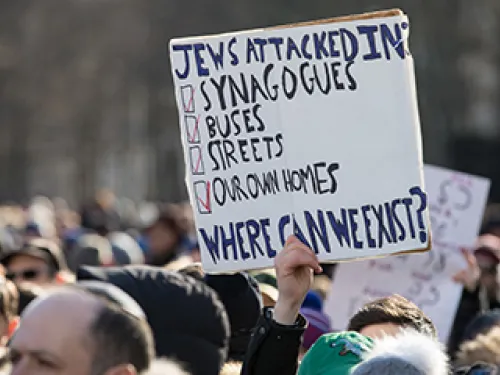Related Content
February 29, 2016
Fighting hate online has never been more critical – the world’s top terrorists, domestic hate groups, and common cyberbullies are using social media more than ever to motivate followers and fuel hate.
For more than 100 years, the Anti-Defamation League has fought against bigotry and anti-Semitism by exposing and reporting on extremist groups who spread hate and incite violence. Today, a big part of that work is combating hate and intolerance online (“cyberhate”), and countering violent extremism.
Since publishing its first report on cyberhate in 1985, ADL has been an international leader in tracking, exposing, and responding to hate on the Internet. It advises all the major social media platforms and law enforcement.
ADL’s team of experts – analysts, investigators, researchers, and linguists – use cutting-edge technology to monitor, track, and disrupt extremists and terrorists worldwide. ADL was one of the first groups to detail terrorists’ use of Twitter for recruiting. ADL believes an “all hands on deck” approach is required to confront the sophisticated online recruitment efforts employed by ISIS and other terror groups.
It coordinates closely with U.S. law enforcement, warning it about online hate activities and trends in real time to stop their spread and prevent harm to communities.
Last year, ADL participated in the White House Summit on Countering Violent Extremism, and it helps lead a pilot project in Boston fostering partnerships between the public and private sector organizations who can help prevent violent extremism.1
The League’s leadership on cyberhate also guides the best known Internet companies. For years, ADL has convened a working group on cyberhate that includes tech companies, academics, and other leaders who evaluate current practices and develop new strategies for responding to hate online. As an outgrowth of this working group, and in consultation specifically with Facebook, Google, Microsoft, Twitter, Yahoo, and YouTube, ADL in 2014 created best practices to counter online hate that have become a template for responsibility and a centerpiece for coordination between the industry and community. These companies and others have publicly endorsed the document and put the standards to use. ADL has also worked closely with these platforms and Apple on an individual basis to address specific concerns about hateful content without infringing on the freedom of speech.
ADL was an inaugural member of the Twitter Trust & Safety Council, which began work in early 2016 to combat hate while ensuring that people are able share their views freely.
The organization has a specific initiative to prevent cyberbullying of youth. The League has developed a toolkit and educational resources for parents, part of its extensive K-12 program to foster greater tolerance in society.
Examples of Countering Hate Online
- ADL’s close online monitoring and sharing of intelligence over years with the FBI, NYPD and other law enforcement agencies helped lead to the arrest of Revolution Muslim’s leadership and ultimately the demise of one of the most influential Islamic extremist groups in the U.S.
- ADL works with Paypal, Gofundme, Indiegogo, and other e-commerce and funding platforms to interrupt monetization by hate groups.
- Working closely with Amazon, ADL persuaded the company to include permanent reviews to listings for Hitler’s Mein Kampf and a well-known anti-Semitic tract, the Protocols of the Learned Elders of Zion, providing important context for individuals attracted by those publications.
- After ADL revealed that Apple’s iTunes and Google Play were providing access to terrorist group Hezbollah’s satellite TV station and a Hezbollah app, both media companies removed the content from their sites.
- Based on information ADL provided to Arizona law enforcement on the leader of a white supremacist group – including images of the convicted felon in possession of a firearm – police investigated and the man was sentenced to seven years in prison for violating his probation.
- In response to an uptick in the number of foreign hackers targeting Jewish organizations, ADL issued a security alert urging synagogues and other Jewish institutions to work to secure their websites and important data online. One hacker group attacked a Florida synagogue’s website, redirecting visitors to a page with messages expressing support for ISIS. ADL informed law enforcement and social media companies about this and other similar attacks, and as a result the companies disabled the hacker’s accounts.
- Thanks to information from ADL, YouTube cut off Iranian news channel Press TV's ability to use YouTube to broadcast hate and spread conspiracy theories in English and Spanish.
Resources & Reports
ADL Best Practices for Responding to Cyberhate
Facebook, Google, Microsoft, Twitter, Yahoo, YouTube and other companies have adopted ADL’s standards for responding to hate online.
ADL Cyber-Safety Action Guide
To empower any consumer to take action against Internet hate speech, ADL in 2013 created the guide and an online portal to make it easy for any member of the public to register complaints with the most frequented websites and major social media channels, including AT&T, eBay, Facebook, Google, Instagram, LinkedIn, Pinterest, Twitter, Yahoo and YouTube.
Tweeting for Terror
This ADL report, one of the first of its kind, explained how foreign terrorist organizations exploit various social media platforms to spread their ideology, attract followers, and reach vast and constantly connected audiences around the world.
Responding to Cyberhate Toolkit for Action
ADL published this in 2010 to educate the public and decision-makers about the array of cyberhate issues, and it recommended what parents, media companies, government and everyday consumers can do to combat online hate.
1Fact sheet on February 2015 White House Summit on Countering Violent Extremism, with details on the public-private pilot projects in Boston, Los Angeles and the Twin Cities







